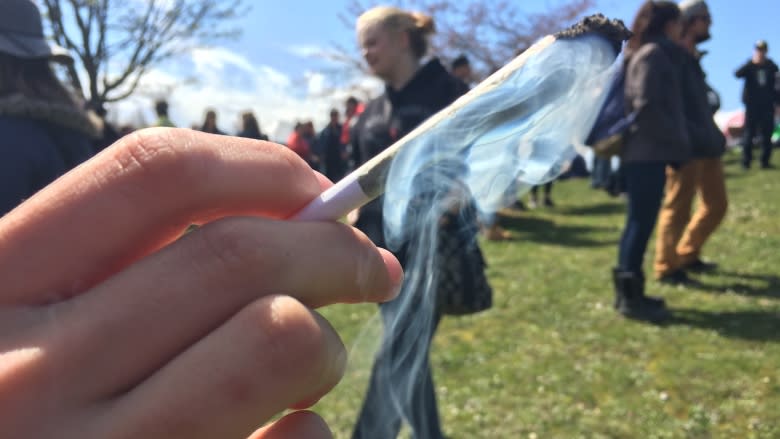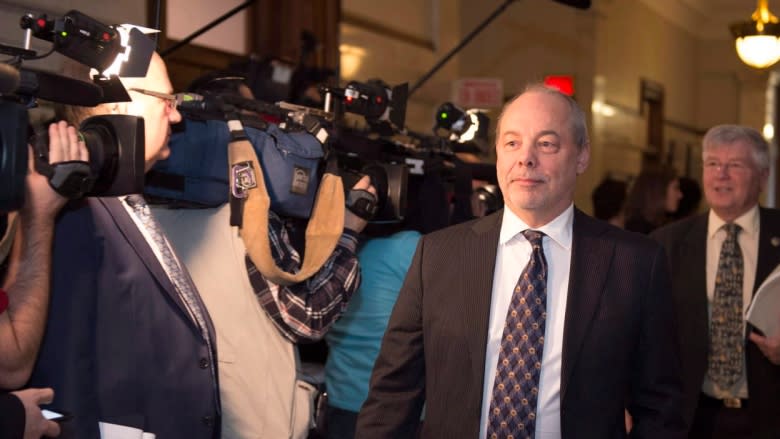Cannabis, identity politics on agenda as Quebec's fall session gets underway
Quebec Premier Philippe Couillard sounded a lot like a man in full campaign mode last week when he promised a "different style" of governing in the final year of his mandate.
"My two main political adversaries come from the last century. When did they come into politics? The last century. We are here for the present and the future," he said at the end of his party caucus meeting on Friday.
Couillard faced pushback for that comment, especially since his governing Liberals, struggling in the polls, have been in power for 12 of the last 14 years.
With Quebec MNAs returning to the National Assembly today for the start of the fall session, it will soon be clear whether the "different style" Couillard's vows to present translates into real change or merely a cosmetic makeover.
Here's a look at what's coming.
The identity debate — again
Questions around identity and religious accommodation will once again be at the centre of Quebec politics.
Bill 62 would require faces to be uncovered when giving or receiving government services and would create a framework for reasonable accommodations.
The legislation was tabled in 2015 and has been subject to heated debate ever since.
In August, Justice Minister Stéphanie Vallée tabled controversial amendments that extend the bill to municipalities and transit agencies.
Both the Opposition Parti Québécois and the Coalition Avenir Québec have criticized the Couillard government for not going far enough.
At the same time as the Bill 62 debate, Quebec is holding an inquiry into systemic racism, though much of it will be held behind closed doors, and another into the treatment of Indigenous peoples.
All this will play out as officials continue to deal with the summer's surprise influx of asylum seekers crossing into Quebec from the U.S.
Setting rules for legal pot
The Quebec government still hasn't come up with a plan for how to regulate the consumption and sale of marijuana, even though Ottawa is planning to make it legal next July.
The big question is: where will cannabis be sold?
Neighbouring Ontario released it own plan earlier this month, saying it will open up to 60 provincially run storefronts in the first year to manage the sale and distribution of marijuana.
Quebec has committed to tabling legislation this fall, after hearings on the issue wrapped up last week in Gatineau.
Showdown with doctors
Quebec's Federation of General Practitioners (FMOQ) and Health Minister Gaétan Barrette could be headed for a showdown by the end of this year.
Under the controversial Bill 20, passed in 2015, 85 per cent of Quebecers are required to have a family doctor by the end of year — or the doctors could face a pay cut of up to 30 per cent.
Just over 75 per cent of Quebecers had a family doctor as of March 31.
FMOQ president Dr. Louis Godin has argued the deadline isn't fair, and the federation is doing all it can to ensure the percentage of residents with a doctor keeps rising.
Barrette said he has no plans to change the deadline.
Byelection test
The Liberals will face a big test of their re-election chances early in the fall, with a byelection scheduled for Oct 2.
Louis-Hébert has been solidly Liberal since 2003, when former cabinet minister Sam Hamad posted the first in a string of lopsided victories.
But polls suggested the CAQ had momentum, and many expected the National Assembly's second opposition party could pull off an upset.
That was before one of the stranger days in Quebec politics: in the span of just a few hours on Sept. 6, both the Liberal and CAQ candidates dropped out of the race after unsavoury elements of their pasts were revealed.
It's unclear which party came out looking worse, and now both parties have some skin in the outcome next month.
A Liberal victory would calm skittish nerves within the party.
But a CAQ win, against the odds, would make the party look like the government-in-waiting.
New look Liberals
The byelection blunder by the Liberals was the final straw for Couillard's chief of staff, the loyal-but-loathed Jean-Louis Dufresne.
Many in the Liberal caucus chafed under his commands, ensuring his unpopularity was an open secret among National Assembly reporters.
Couillard replaced Dufresne with 38-year-old Jean-Pascal Bernier, and the hope is he will bring a bit of youth and vigour to the Liberal ranks.
That has some wondering if the changes will stop there.
There is speculation in Quebec City that Couillard might shuffle his cabinet this fall, in an effort to persuade voters of the seriousness of his intent to offer something different in the run-up to the 2018 election.
Fall economic update
The good economic times continue to roll in Quebec. Unemployment is at its lowest rate in a generation, and the province boasts of GDP growth making the rest of the federation jealous.
That, of course, means the government continues to rake in the revenues, posting nearly a half-billion dollar surplus for June alone.
Finance Minister Carlos Leitao has promised repeatedly to lighten the tax load of Quebecers when finances allow.
Given the government's flush financial picture, many will be looking for him to announce tax cuts in the spring budget or possibly even in a fall economic update.



